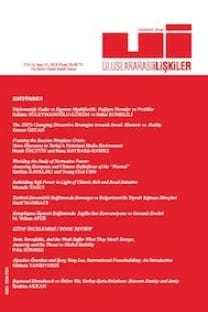“Uluslararası” Fikri, Epistemolojik Yanılgı ve Eleştirel Gerçekliğin İmkânları
Bu makale Yeni Gerçekçilik ve Yeni Kurumsalcılığın anarşi ilkesine dayanan uluslararası fikrini eleştirel gerçekçi bilim felsefesini kullanarak irdelemektedir. Bu iki kuram her ne kadar bazı konularda ayrışsalar da anarşi kavramı üzerinden monolitik, tarihötesi ve asosyal bir uluslararası fikri üretirler. Bu makalenin iddiası Eleştirel Gerçekçi bilim felsefesi vasıtasıyla rasyonalist/pozitivist geleneğe dayanan bu hâkim kuramların temel sorununu tespit etmenin mümkün olduğudur. Eleştirel Gerçekçi bilim felsefesi prizmasından bakıldığında rasyonalist kuramlar epistemolojik yanılgı tuzağına, yani epistemolojiyi ontoloji yerine koyma hatasına düşmektedirler. Bir başka deyişle rasyonalist kuramcıların anarşi ilkesi üzerinden kurdukları uluslararasına dair ontoloji bu kuramcıların epistemolojisinden daha öte bir şey değildir. Bu bağlamda ontolojik muhasebeyi ve katmanlı ontolojiyi savunan Eleştirel Gerçekçi bilim felsefesinin disiplin içinde uygulama alanlarını çoğaltması farklı kültürel, coğrafi , sosyal tarihselliklerin de uluslararası fikrine dâhil edilmelerinin önünü açabilecektir.
Anahtar Kelimeler:
Uluslararası İlişkiler Kuramları, Pozitivizm, Ontoloji, Eleştirel Gerçekçi Bilim Felsefesi, Roy Bhaskar.
“The International”, Epistemic Fallacy and Possibilities of Critical Realism
This article examines the main assumptions of neo-realism and neo-liberalism from the perspective of a critical realist philosophy of science. Although neo-realist and neo-liberal theories of international relations (IR) disagree on some issues, they do have a common ontological understanding of “the international” based heavily on the principle of anarchy. The centrality of and emphasis on anarchy, in turn, creates a monolithic, unhistorical and asocial idea of the international. This article argues that a critical realist philosophy of science, as proposed by Roy Bhaskar, provides a good framework to pursue the ontological interrogation required to deconstruct the anarchy centered idea of the international assumed by rationalist/positivist theories. Critical realism allows us to identify the crucial error that the rationalist/positivist tradition commits: which is to fall into the trap of ‘epistemic fallacy’, where ontological questions concerning the nature of being are posed and answered in epistemological terms. Critical realism not only provides a tool to investigate the ontological assumptions of mainstream IR theories but also to propose a differentiated and stratified ontology that can open the door to the mutual recognition of alternative perspectives.
Keywords:
Positivism, Ontology, Critical Realist Philosophy of Science, Roy Bhaskar, Theories of International Relations,
___
- .....
- ISSN: 1304-7310
- Başlangıç: 2004
- Yayıncı: Uluslararası İlişkiler Konseyi Derneği İktisadi İşletmesi
Sayıdaki Diğer Makaleler
Uluslararası Çevre Rejimlerinde Etkinlik Sorunu
Uluslararası İş Birliğini Yeniden Düşünmek: Rekabet Politikasında Düzenleyici Ağlar Örneği
Algı mı, Söylem mi? Kopenhag Okulu ve Yeni Klasik Gerçekçilikte Güvenlik Tehditleri
H. Tolga BÖLÜKBAŞI, Ebru ERTUGAL, Saime ÖZÇÜRÜMEZ
Stepte ve Erken Dönem Avrupa’sında Devlet Oluşumu
“Uluslararası” Fikri, Epistemolojik Yanılgı ve Eleştirel Gerçekliğin İmkânları
